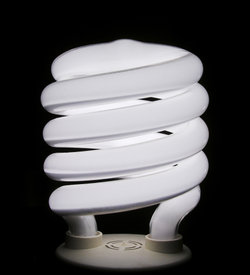| Willipedia is now back online as of 5/5/2019 |
| It has been several years since Willipedia closed. Please help get it updated! |
| Go to the Willipedia 2.0 Project to learn more. |
Difference between revisions of "Compact fluorescent lightbulb"
(uploaded picture and put as thumbnail) |
|||
| (4 intermediate revisions by 3 users not shown) | |||
| Line 1: | Line 1: | ||
[[Image:CFL.jpg|right|thumb|A CFL]] | [[Image:CFL.jpg|right|thumb|A CFL]] | ||
| − | Compact Fluorescent Lightbulbs are new, energy efficient lightbulbs. | + | Compact Fluorescent Lightbulbs are new, energy efficient lightbulbs. The ones provided by Facilities use only 15w but provide light equivalent to 60w, although other wattages are commercially available. In general, they use 1/4 of the wattage of an incandescent bulb producing the same amount of light. |
| − | + | Additionally, they produce more low-spectrum (blue) light (i.e. they have a higher color temperature). This more closely emulates the spectrum of natural sunlight and is thought to have more of an impact on circadian rhythm. This means you will be more alert during late night study sessions with compact florescent bulbs than with incandescents. | |
| − | + | CFL's save energy, reduce carbon dioxide emissions, and save money on electricity bills. They also produce less heat, so your reading lamp will not be as hot to the touch. | |
| − | So far, approximately 950 lightbulbs have been exchanged from Mission, the Frosh Quad, and Dodd | + | Throughout the year, [[Thursday Night Group]] works to exchange all student incandescent lightbulbs on campus to CFL's. |
| + | |||
| + | So far, approximately 950 lightbulbs have been exchanged from [[Mission]], the [[Frosh Quad]], and [[Dodd House]]. | ||
| + | |||
| + | However, these bulbs do contain mercury, so broken bulbs should be handled with care, and steps should be taken to ensure safety. Also, if broken or burnt out, they should be recycled and not placed in the general trash. | ||
Latest revision as of 23:21, August 20, 2008
Compact Fluorescent Lightbulbs are new, energy efficient lightbulbs. The ones provided by Facilities use only 15w but provide light equivalent to 60w, although other wattages are commercially available. In general, they use 1/4 of the wattage of an incandescent bulb producing the same amount of light.
Additionally, they produce more low-spectrum (blue) light (i.e. they have a higher color temperature). This more closely emulates the spectrum of natural sunlight and is thought to have more of an impact on circadian rhythm. This means you will be more alert during late night study sessions with compact florescent bulbs than with incandescents.
CFL's save energy, reduce carbon dioxide emissions, and save money on electricity bills. They also produce less heat, so your reading lamp will not be as hot to the touch.
Throughout the year, Thursday Night Group works to exchange all student incandescent lightbulbs on campus to CFL's.
So far, approximately 950 lightbulbs have been exchanged from Mission, the Frosh Quad, and Dodd House.
However, these bulbs do contain mercury, so broken bulbs should be handled with care, and steps should be taken to ensure safety. Also, if broken or burnt out, they should be recycled and not placed in the general trash.
